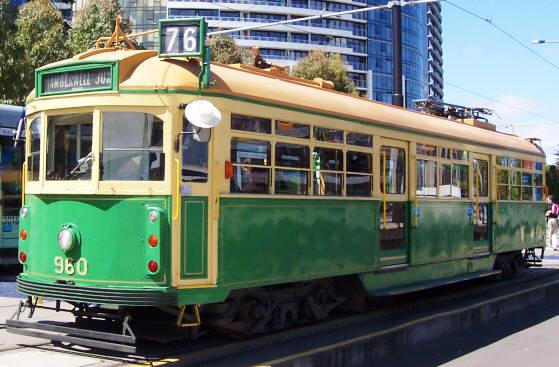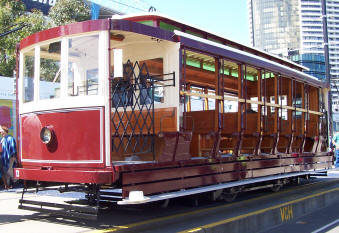Melbourne Trams

Melbourne's iconic 'W Class' Tram
Melbourne without trams is unthinkable!
It has come close at times over the last 100 years, but the forces of good, righteousness and the Melbourne Way have prevailed.
Sydney had trams once. In fact the expression shot through like a Bondi tram has entered the language. But they sold out to modernism and the international movement. Those ideas and books took longer to get to Melbourne.
We certainly had a good attempt at destroying our heritage in the name of modernism for the Olympic Games in 1956, but anachronisms like the trams and the Exhibition Buildings managed to survive because they were just too bloody useful.
Melbourne's first electric trams ran between Box Hill and Doncaster from 1889 to
1896.
The Melbourne W-class tram is an engineering classic. It is simple, highly efficient and economical, and just keeps on going year after year. It is little surprise to know that it is classified by the National Trust.
|


� Colonial Tramcar Restaurant |
|
|
| |
Some suggested tram journeys:
- Ride the free City Circle Tram
- Taking a number 10 in Collins Street through Brunswick Street to the Edinburgh Gardens
- Take a number 15 in Swanston Street through St. Kilda to Ackland Street
- Take a number 12 in Collins Street where you can often find a W class tram running along this typical old-style inner suburban route.
- Take a trip through Royal Park by catching a tram in William Street
- You can always dine on the Colonial Tramcar Restaurant (see left)

Historic 'Toast Rack' Tram |
Unfortunately, although trams appear on the surface to be 'clean and green', the story is not quite as simple on closer investigation. You can find more reflections at Green Issues in Melbourne in our newsletter No.45 of 3rd April 200
Some related links
- Until well into the 20th century, the road space between tram
tracks and to a certain distance either side was filled red gum
blocks, and you can still find some examples remaining around
Melbourne. The red gum was used even though cement and asphalt were
readily available and in common use. There is a very good reason for
their use. What was the reason for using red gum blocks and where
can you see remaining examples of these blocks?
You can find many more questions like this at
The White Hat Quiz.